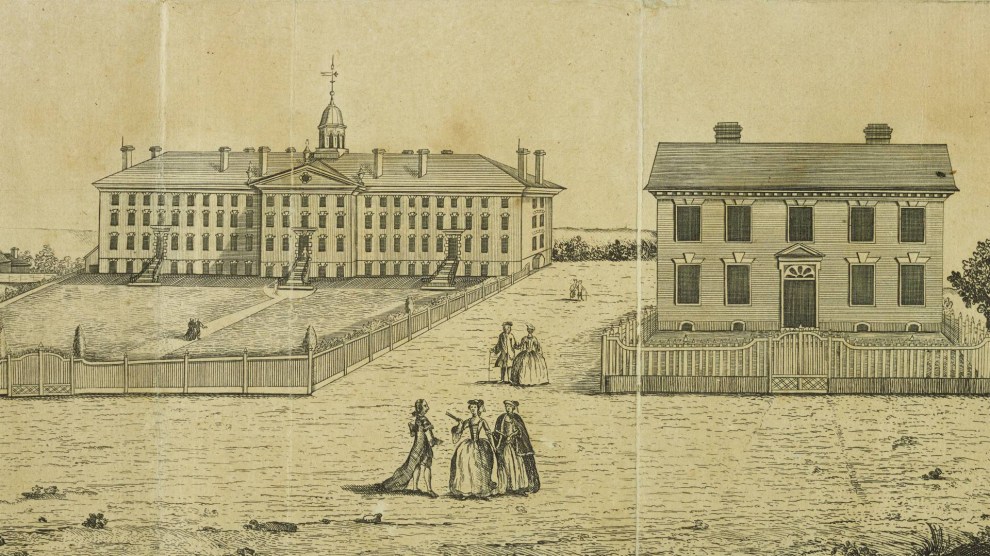
Michelle Obama at the DNC on Tuesday.Nate Gowdy
It’s fair to say that Michelle Obama stole the show at the Democratic Convention on Tuesday. (Husband Barack was on point in noting how hard an act she was to follow.) And to a journalist like me who covers wealth and inequality, one line in particular stood out. Listen:
The affirmative action of generational wealth. That’s a smart reframing of a longtime conservative hobby horse.
Republican politicians and right-wing media have regularly attacked programs designed to counter the generational impacts of government-sanctioned discrimination in housing, education, and veterans benefits. Now they’re targeting diversity, equity, and inclusion programs—see JD Vance’s recently introduced “Dismantle DEI Act“—and trying to brand Kamala Harris a “DEI hire.” That’s a laughable assertion. (New York Times columnist Lydia Polgreen argues that the moniker applies more aptly to Vance.)
But the critics of DEI and affirmative action want to have their cake and eat it too. For example, if you, like our Supreme Court, think the use of race as a factor in college admissions should be illegal, that’s your prerogative. But I hope you are similarly inclined to outlaw the practice of elite colleges giving an admissions boost to children of alumni and to students (like Jared Kushner) whose parents are major donors. Because isn’t that, too, a kind of affirmative action?
In just a handful of words, Michelle Obama managed to convey a simple truth, says Dedrick Asante-Muhammad, president of the Joint Center for Political and Economic Studies, a Washington think tank that focuses on the racial wealth-and-opportunity gap: “It is not those asking to break up concentrated wealth and opportunity that are asking for an unfair advantage, but rather those who are hoarding concentrated wealth.”
“Most of us,” as Obama noted, “will never benefit” from generational wealth. And that’s true of everyone, but even truer when you are Black or Hispanic. In the Federal Reserve Board’s 2019 Survey of Consumer Finances (SCF)*, about 47 percent of white respondents said they’d either received an inheritance or expected to receive one. Their median inheritance expected was $195,500 (in 2019 dollars).
Only 16 percent of Black respondents had received or expected an inheritance—and their median expectation was about half the white figure. Less than 12 percent of Hispanic respondents had received or expected an inheritance.
The disparities are similar when you look at federally subsidized retirement savings, which, according to the congressional Joint Committee on Taxation (JCT), will cost US taxpayers nearly $2.5 trillion from 2023-2027. Most of that cash goes to the wealthiest 10 percent of Americans, who tend to be, yep, pretty white.
In 2021, the JCT identified 8,000 Americans with Individual Retirement Account (IRA) balances in excess of $5 million who were still getting tax breaks for their annual contributions—which is “shocking but not surprising,” noted Senate Finance Committee chair Ron Wyden. Peter Thiel, ProPublica reported, even managed, using questionable tactics, to amass a Roth IRA worth $5 billion.
Affirmative action for the rich.
According to the latest (2022) SCF, only 35 percent of Black families and less than 28 percent of Hispanic households even had a retirement account, compared with 62 percent of white families. The accounts of those white families were worth over $380,000 on average, more than triple the Black and Hispanic savings—and again, these numbers don’t account for the fact that a large majority of Black and Hispanic households have no private retirement accounts at all.
Then there’s land ownership—see “40 Acres and a Lie,” our acclaimed multimedia package exploring how the few Black families who received land reparations after the Civil War then had their acres cruelly rescinded a year and a half later. And consider these passages on the Homestead Acts, from a chapter of my 2021 book, Jackpot, titled “Thriving While Black.”
The two acts, passed during and after the Civil War, granted 160-acre parcels of public land—a foundation for generational wealth—to families willing to stake out the plots and make improvements. But the timing and circumstances made it extraordinarily difficult for Black Americans to participate:
It was a once-in-a-lifetime bonanza for white fortune-seekers. “The acquisition of property was the key to moving upward from a low to a higher stratum,” wrote author Everett Dick. “The property holder could vote and hold office, but the man with no property was practically on the same political level as the indentured servant or slave.” […]
Between the two acts, about 270 million acres of farmland—14 percent of the total landmass of the continental United States—was granted to 1.6 million white families, but only 4,000 to 5,000 Black families. [University of Michigan professor Trina] Shanks calculates that more than 48 million living Americans are direct descendants of those Homestead Act beneficiaries. Which means there’s a greater than one-in-four chance your forebears benefited directly from the biggest public-to-private wealth transfer in American history—if you’re white, that is.
Affirmative action for the rich.
Obama hit the nail on the head. Asante-Muhammad says he was struck by her simple acknowledgement “that affirmative action for the privileged happens,” though “I wish there could have been a follow up to re-emphasize why programmatic affirmative action to advance more equal opportunity is necessary.”
But “it felt good,” he adds, “to hear a political speech that connects so personally with my political ideals, and to the challenges of the racial wealth divide and the action and ideals needed to bridge it.”
*I used 2019 numbers here because the 2022 inheritance data was only available in raw form.

















